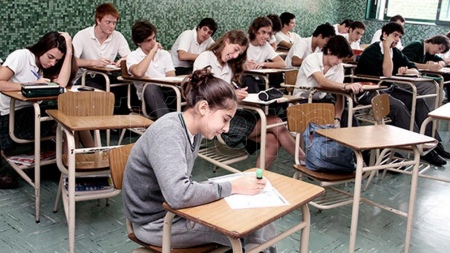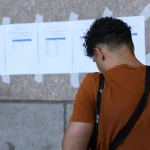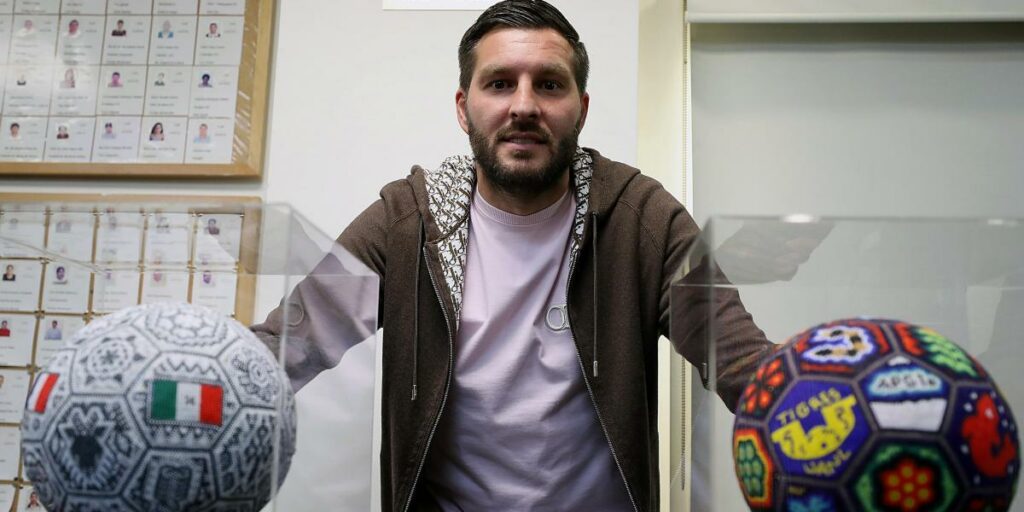The Minister of Economy, Sergio Massa, announced on Tuesday an agreement with the chambers of private schools with “an increase guideline that intends to establish a mechanism until June that does not exceed the inflation target.”
This agreement “allows us to lower the initial increase by more than half at 16.38% and from there to follow a path of 3.35 until June,” Massa announced this afternoon, accompanied by the Minister of Education, Jaime Perczyk, and representatives of the chambers of private schools.
On the side of the educational entities were the main directors of the Argentine Chamber of Private Institutions (Caiep), the Coordinating Board of Private Education Associations of the Argentine Republic (Coordiep) and the Superior Council of Catholic Education (Consudec).
“For us, being able to give Argentines certainty is an obligation every day,” Massa stressed.
The minister also announced that from the Government “we have consolidated an agreement with more than 80 companies to have a school basket that continues at 3.2% price update in the coming months, which aims to ensure that our families’ expenses in March do not hit wages, income, and that the children go to school normally.
Along with this, Massa anticipated that will seek an agreement with all jurisdictions so that private schools pay for electricity and gas services under a scheme similar to the one that exists for neighborhood clubs, framed in the social task they carry out.
In his speech, the head of the Palacio de Hacienda thanked “all the chambers that represent private educational entities, the Minister of Education and the Secretary of Commerce” for having reached this agreement, “because they already in December increases of 25% had been set, and in some cases 30% for Marchwhich really, added to the expenses that he had day by day, put many Argentine families in a complex situation”.
This “voluntary agreement” involves an initial increase “not to exceed 16.3% and from there a path of 3.35% per month until June. Starting from that month, we are going to work on a compensation box”Massa explained.
“We worked on the commitment of this issue with the vast majority of the jurisdictions of Argentina so that it is not only an agreement that influences schools in the capital or province, but also in schools throughout the country. We hope for the commitment of all Provincial governments, understanding that when we lower family spending in terms of what influences the cost of starting classes in March, what we are doing is making them live a little better,” Massa completed.
For his part, Perczyk He thanked “the effort, work and commitment of the representatives of private education to give predictability to the increases in school fees and bring economic peace of mind to families.”
“Argentina has an educational system in which 75% are public establishments and the remaining 25 are privateThat is why we appreciate that you join this agreement”, the minister completed.
Perczyk stated that this agreement “is one more step towards the start of the next school year” and he invited the 23 provinces and the City of Buenos Aires to “adhere to the agreement signed today.”
The agreement establishes that private schools with state subsidies may increase fees by 16.8% in March and 3.35 in April, May and June.
Also participating in the signing of the agreement were the Executive Advisor of the Ministry of Education, Mario Caputo; the director of Public Education for Private Management, María Gloria Zingoni; the General Secretary of the Federal Education Council, Marcelo Mango; and the Undersecretary of Policies for the Internal Market, Gustavo Faskowicz.
Perczyk highlighted the commitment to subsidize the energy rates of private schools
The Minister of EducationJaime Perczyk, rescued the commitment of the Ministry of Economy to subsidize expenses of public services and investments in infrastructure of privately managed schoolsas part of an agreement reached with the institutions to moderate the increase in fees until June.
In this sense, the schools will apply an increase of 16.38% in the fees for March and, thereafter, a 3.35% monthly until June, as confirmed by the Minister of Economy, Sergio Massa, in a meeting with representatives of private schools that he headed together with Perczyk.
also announced a reinforcement of educational subsidies to the provinces and that work will be done so that the schools pay a electricity bill “similar to that of the neighborhood clubs”.
“We value the efforts of the Ministry of Economy in terms of energy and subsidies for infrastructure expenses through different mechanisms that the government will build,” said Perczyk, who highlighted that 25% of the country’s schools are privately managed , although “the education system is public and with public responsibilities”.
“The premise with which we work is respect for teachers and our schools. We appreciate and value the effort that everyone has made,” he closed.

















